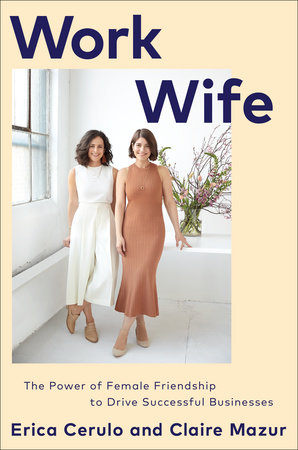Work Wife
The Power of Female Friendship to Drive Successful Businesses
Erica Cerulo and Claire Mazur
Hardcover
March 5, 2019 | ISBN 9781524796778
AmazonBarnes & NobleBooks A MillionBookshop.orgHudson BooksellersPowell'sTargetWalmart
Ebook
March 5, 2019 | ISBN 9781524796792
AmazonApple BooksBarnes & NobleBooks A MillionGoogle Play StoreKobo
About the Book
Get inspired by the women who discovered that working with your best friend can be the secret to professional success—and maybe even the future of business—from the co-founders of the website Of a Kind.
“Read this, then plot your own work-wife-driven empire.”—Glamour
When Erica Cerulo and Claire Mazur met in college in 2002, they bonded instantly. Fast-forward to 2010, when they founded the popular fashion and design website Of a Kind. Now, in their first book, Cerulo and Mazur bring to light the unique power of female friendship to fuel successful businesses. Drawing on their own experiences, as well as the stories of other thriving “work wives,” they highlight the ways in which vulnerability, openness, and compassion—qualities central to so many women’s relationships—lend themselves to professional accomplishment and innovation.
Featuring interviews with work wives such as Amanda Hesser and Merrill Stubbs of the influential food community site Food52, Ann Friedman, Aminatou Sow, and Gina Delvac of the hit podcast Call Your Girlfriend, and Misty May-Treanor and Kerri Walsh Jennings of Olympic volleyball fame, Work Wife addresses a range of topics vital to successful partnerships, such as being co-bosses, tackling disagreements, dealing with money, and accommodating motherhood. Demonstrating how female partnerships in the office are productive, progressive, and empowering, Cerulo and Mazur offer an invaluable roadmap for a feminist reimagining of the workplace.
Fun, enlightening, and informative, Work Wife is a celebration of female friendship and collaboration, proving that it's not just feasible but fruitful to mix BFFs with business.
Praise for Work Wife
“Is the old adage ‘Friends and business don’t mix’ true? Not according to college friends Cerulo and Mazur, who translated their love of fashion and desire to support emerging fashion designers into a successful business, the e-commerce site Of a Kind. . . . By exploring topics such as setting expectations, defining roles, dividing responsibility, dealing with finances, and addressing disputes, they deftly demonstrate how female friendships produce empowering business partnerships. . . . This insightful, engaging work is an essential guidebook for friends considering a business collaboration.”—Library Journal (starred review)
“Engaging and thoughtful, Work Wife champions strong relationships, healthy attitudes, and pragmatic decision-making—an excellent primer for women interested in creating their own opportunities.”—Booklist (starred review)
“Read this, then plot your own work-wife-driven empire.”—Glamour
When Erica Cerulo and Claire Mazur met in college in 2002, they bonded instantly. Fast-forward to 2010, when they founded the popular fashion and design website Of a Kind. Now, in their first book, Cerulo and Mazur bring to light the unique power of female friendship to fuel successful businesses. Drawing on their own experiences, as well as the stories of other thriving “work wives,” they highlight the ways in which vulnerability, openness, and compassion—qualities central to so many women’s relationships—lend themselves to professional accomplishment and innovation.
Featuring interviews with work wives such as Amanda Hesser and Merrill Stubbs of the influential food community site Food52, Ann Friedman, Aminatou Sow, and Gina Delvac of the hit podcast Call Your Girlfriend, and Misty May-Treanor and Kerri Walsh Jennings of Olympic volleyball fame, Work Wife addresses a range of topics vital to successful partnerships, such as being co-bosses, tackling disagreements, dealing with money, and accommodating motherhood. Demonstrating how female partnerships in the office are productive, progressive, and empowering, Cerulo and Mazur offer an invaluable roadmap for a feminist reimagining of the workplace.
Fun, enlightening, and informative, Work Wife is a celebration of female friendship and collaboration, proving that it's not just feasible but fruitful to mix BFFs with business.
Praise for Work Wife
“Is the old adage ‘Friends and business don’t mix’ true? Not according to college friends Cerulo and Mazur, who translated their love of fashion and desire to support emerging fashion designers into a successful business, the e-commerce site Of a Kind. . . . By exploring topics such as setting expectations, defining roles, dividing responsibility, dealing with finances, and addressing disputes, they deftly demonstrate how female friendships produce empowering business partnerships. . . . This insightful, engaging work is an essential guidebook for friends considering a business collaboration.”—Library Journal (starred review)
“Engaging and thoughtful, Work Wife champions strong relationships, healthy attitudes, and pragmatic decision-making—an excellent primer for women interested in creating their own opportunities.”—Booklist (starred review)
Read more
Close




